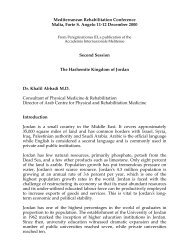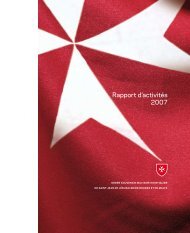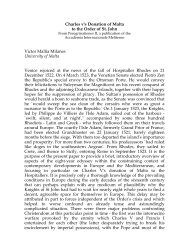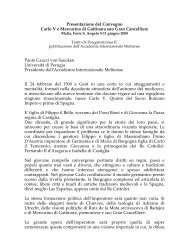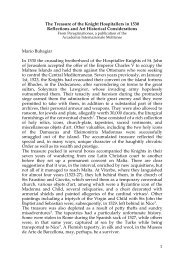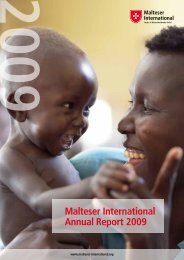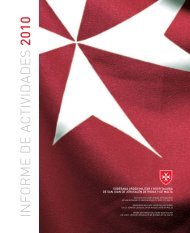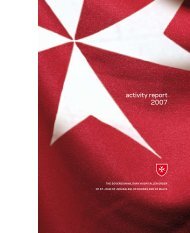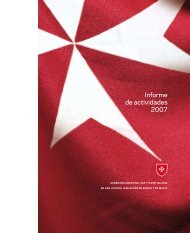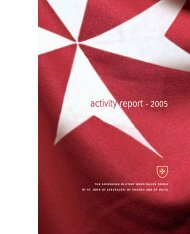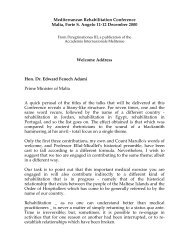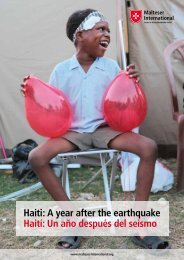Annual report 2005 Malteser International - Ordine di Malta
Annual report 2005 Malteser International - Ordine di Malta
Annual report 2005 Malteser International - Ordine di Malta
Create successful ePaper yourself
Turn your PDF publications into a flip-book with our unique Google optimized e-Paper software.
Mali and Niger<br />
As a result of the drought and a plague<br />
of grasshoppers, the <strong>di</strong>re need of the<br />
people of the Sahel zone – particularly in<br />
Mali and Niger – became so widespread in<br />
summer <strong>2005</strong> that <strong>Malteser</strong> <strong>International</strong><br />
expanded its aid programme from eastern<br />
and southern Africa to cover the west<br />
of the continent as well. In the shortterm,<br />
we sent an assessment team who<br />
rapidly collected reliable information and<br />
imme<strong>di</strong>ately started an aid programme<br />
for the people of Mali and Niger.<br />
In Mali, we supported the National<br />
Security Stock. Thanks to comprehensive<br />
financial aid, the Malian government<br />
was able to procure 520 tonnes of cereals<br />
for 17 cereal banks across the country.<br />
This meant several thousand people<br />
were supplied with food which led to an<br />
Niger: Each family receives 20 kilograms of maize. Half of the next harvest will be given back to the community<br />
to build up stocks for emergencies.<br />
Mali: Filling the national cereal banks with 520<br />
tonnes of cereal.<br />
extensive improvement in the foodstuffs<br />
situation, particularly in Mopti - around<br />
640 kilometres north-east of the Malian<br />
capital, Bamako.<br />
In Niger, the lack of rainfall and the<br />
grasshopper invasions also led to a<br />
serious cereals deficit. Here, <strong>Malteser</strong><br />
<strong>International</strong> chose a <strong>di</strong>fferent approach<br />
in combating the problem. As many<br />
people, particularly children, are regularly<br />
affected by malnutrition as the result<br />
of natural <strong>di</strong>sasters - particularly in the<br />
summer of <strong>2005</strong> -, we decided to tackle<br />
the problem on a broader basis and at the<br />
roots. We initially restocked the levels<br />
in a cereal bank, as we <strong>di</strong>d in Mali. 15<br />
villages were provided with a total of 28<br />
tonnes of maize as seeds. These stocks<br />
will help them survive the period until<br />
the next harvest. However, each recipient<br />
has also simultaneously pledged to ‘pay<br />
back’ part of their next harvest as seeds to<br />
the relevant village committee, in order to<br />
secure stocks for the coming year and in<br />
case of any future <strong>di</strong>sasters.<br />
Sudan<br />
<strong>International</strong> staff: 11<br />
National staff: 237<br />
Aid for 630,000 people<br />
<strong>Malteser</strong> <strong>International</strong> has worked in<br />
Sudan since 1998.<br />
The peace treaty signed by civil war<br />
groups in the north and south in January<br />
<strong>2005</strong> gave many cause to hope that the<br />
country was finally on a secure road to<br />
peace, but the implementation of the treaty<br />
in the reality of daily life has proven to<br />
be <strong>di</strong>fficult and drawn-out. Furthermore,<br />
this treaty does not apply to the civil war<br />
raging in the Darfur region in the west of<br />
the country. Two of the warring parties<br />
have indeed signed a peace agreement on<br />
5 May 2006 in Nigeria. This agreement,<br />
S L E E P I N G S I C K N E S S :<br />
Sleeping sickness is an infectious <strong>di</strong>sease that<br />
results in death if it is not treated promptly.<br />
It only occurs in a few countries, such as<br />
Sudan, Congo and Uganda. The trigger is a<br />
parasite transmitted by the tsetse fly. In its<br />
final stage, sleeping sickness leads to brain<br />
fevers that also cause sleep <strong>di</strong>sorders (hence<br />
the name). The pathogen can be detected in<br />
the blood or through tapping cerebrospinal<br />
fluid in the spinal cord. Sleeping sickness<br />
must be treated, but this often triggers<br />
side-effects that can also result in death.<br />
However, for around EUR 1,000, a treatment<br />
can be provided that significantly reduces the<br />
mortality risk.<br />
12<br />
A F R I C A



